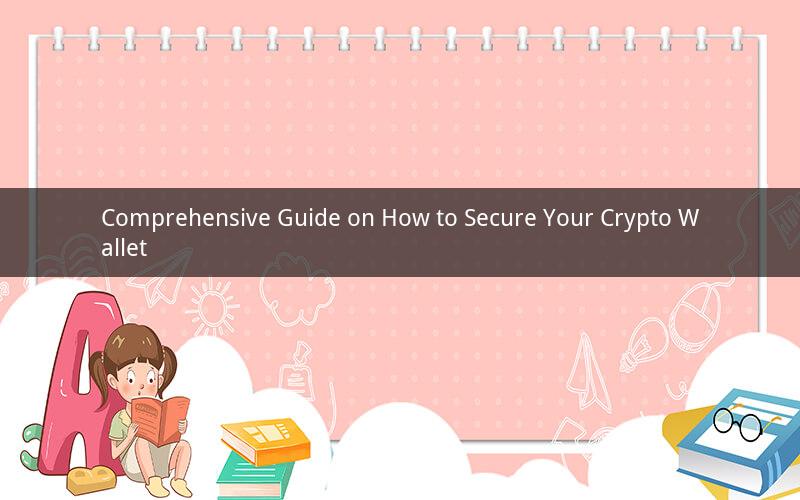
Introduction:
In the rapidly evolving world of cryptocurrencies, securing your digital assets is of paramount importance. A crypto wallet is the digital storage where your cryptocurrencies are kept, and it is crucial to ensure its safety to protect your investments. This guide will provide you with essential tips and best practices on how to secure your crypto wallet.
1. Choose a Reliable Wallet Provider:
The first step in securing your crypto wallet is to select a reputable and reliable wallet provider. Here are some factors to consider:
- Reputation: Research the wallet provider's background, reviews, and customer feedback to ensure their credibility.
- Security Features: Look for wallets that offer robust security features like two-factor authentication (2FA), biometric verification, and cold storage options.
- User-Friendly Interface: A user-friendly interface can help you manage your wallet more efficiently and reduce the risk of errors.
2. Use Strong Passwords and PINs:
Creating strong passwords and PINs is crucial for protecting your crypto wallet. Here are some tips to create a secure password:
- Use a combination of uppercase and lowercase letters, numbers, and special characters.
- Avoid using common words, phrases, or easily guessable information like birthdays or names.
- Use a unique password for each of your wallets to prevent a single breach from compromising all your assets.
3. Enable Two-Factor Authentication (2FA):
Two-factor authentication adds an extra layer of security to your crypto wallet. It requires you to provide two forms of verification before accessing your wallet:
- SMS Verification: Receive a one-time code via SMS to your registered phone number.
- Email Verification: Receive a one-time code via email to your registered email address.
- Authenticator Apps: Use an authenticator app like Google Authenticator or Authy to generate one-time codes.
4. Backup Your Wallet:
Creating a backup of your crypto wallet is essential in case of hardware failure, loss, or theft. Here are some backup methods:
- Paper Wallet: Generate a paper wallet and store your private keys in a secure, physical location.
- Encrypted Backup: Use a reputable encryption tool to backup your wallet file and store it in a secure cloud storage service or external drive.
- Multi-Sig Wallet: A multi-signature wallet requires multiple private keys to authorize transactions, reducing the risk of losing your assets.
5. Keep Your Private Keys Private:
Your private keys are the gateway to your cryptocurrencies. Here are some tips to keep your private keys secure:
- Never share your private keys with anyone, including friends, family, or wallet providers.
- Store your private keys in a secure location, such as a paper wallet or encrypted backup.
- Use a hardware wallet for storing your private keys, as they are designed to provide maximum security.
6. Stay Informed and警惕Phishing Attacks:
Stay updated on the latest crypto wallet security threats and scams. Here are some tips to avoid falling victim to phishing attacks:
- Be cautious of unsolicited emails, messages, or calls asking for your private keys or personal information.
- Verify the legitimacy of websites and wallet providers before accessing them.
- Use secure, reputable wallets and services to manage your cryptocurrencies.
7. Regularly Update Your Wallet Software:
Keep your crypto wallet software up to date to ensure you have the latest security features and patches. Regular updates can protect you from vulnerabilities that hackers may exploit.
8. Use a Secure Internet Connection:
When accessing your crypto wallet, ensure you are using a secure internet connection. Avoid using public Wi-Fi networks, as they can be easily intercepted by hackers.
9. Monitor Your Transactions:
Regularly monitor your wallet transactions for any suspicious activity. If you notice any unauthorized transactions, contact your wallet provider immediately.
10. Educate Yourself on Crypto Security:
The more you know about crypto security, the better equipped you will be to protect your assets. Stay informed about the latest trends, best practices, and common threats in the crypto world.
Frequently Asked Questions:
1. How can I tell if my crypto wallet is secure?
Ensure your wallet provider has a good reputation, offers robust security features, and follows best practices for password management and two-factor authentication.
2. Should I use a hardware wallet or a software wallet?
Hardware wallets are generally more secure for storing large amounts of cryptocurrencies, while software wallets are more convenient for daily transactions. Choose the one that suits your needs and security requirements.
3. What should I do if I lose my private keys?
If you lose your private keys, you will lose access to your cryptocurrencies. Ensure you have a backup of your private keys and follow the backup methods mentioned in this guide.
4. Can I recover my crypto wallet if it gets hacked?
If your crypto wallet gets hacked, it may be possible to recover your assets if you have a backup. However, the process can be complex and may require the assistance of a professional.
5. How often should I update my wallet software?
Regularly update your wallet software to ensure you have the latest security features and patches. Check for updates at least once a month or whenever a new version is released.